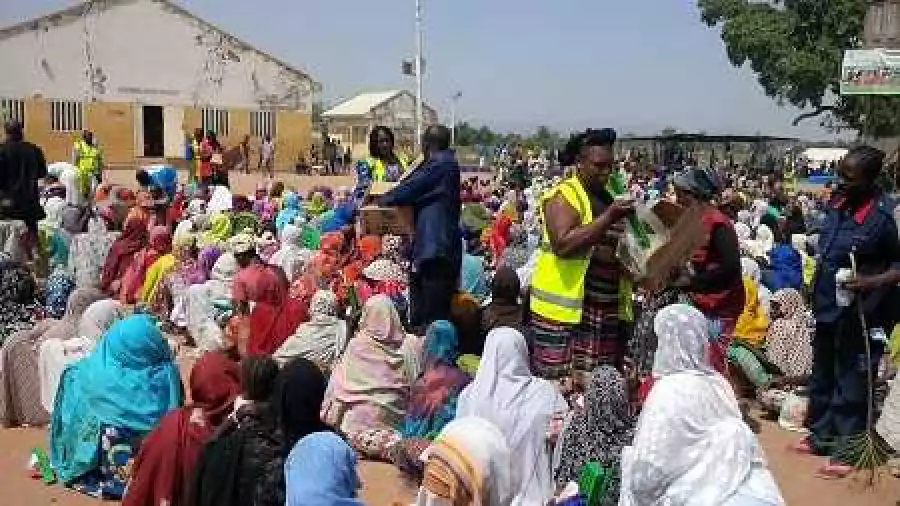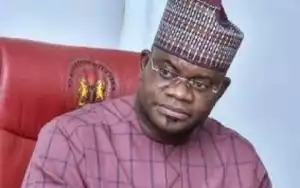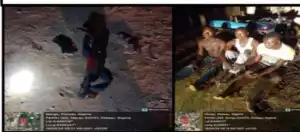Conflict in Nigeria, 11 Other Nations: The Story Of 12.4 Million On the Run in Their Own Countries

Conflict in Nigeria, 11 Other Nations: The Story Of 12.4 Million On the Run in Their Own Countries
Agana, 18, fled her village when Boko Haram attacked. With her husband killed in the ensuing violence, she now lives with her baby in one of Nigeria’s ‘widow’s houses’.
She’s one of more than 40.8 million people around the world on the run in their own countries, according to recent figures by the Internal Displacement Monitoring Centre, (IDMC).
Nearly one third of displaced people are on the African continent where 12.4 million people in 21 countries were living in ongoing displacement as a result of conflict and violence at the end of 2015.
A little acknowledged issue, the number of internally displaced people (IDPs) across Africa is more than twice as many as the continent’s total refugee population of 5.4 million, which only accounts for those who have crossed national borders.
“We are always flabbergasted at just how little people actually acknowledge this issue,” says Alexandra Bilak, Director at IDMC. “There are twice as many conflict IDPs as there are refugees in the world. The figures are quite staggering, the problem is far bigger.”
What is internal displacement?
An internally displaced person is anyone who has been forced to flee their habitual place of residence as a result of conflict, violence, development projects and natural and manmade disasters, regardless of whether or not they are a national of the country, says Bilak, citing the UN Guiding Principles on Internal Displacement. While conflict is the largest cause, natural disasters may also cause the uprooting of communities.
1.8m displaced in Nigeria
Nigeria tops the list of African countries with the most new displacements in 2015 when 737,000 uprooted. More recent figures from the International Organization for Migration (IOM) show that the situation is still dire, with 1.8 million people estimated to have been on the move at the end of 2016. Many have taken refuge in the displacement camps.
“There are huge camps outside the city, with upwards of 35,000 people in each, that are managed by the humanitarian communities such as NGOs and UN partner, with the support of the government,” says Julia Burpee, public information officer at IOM, who works with emergency response in the areas surrounding Maiduguri, in Borno state in the northeast of the country, near the border with Cameroon. Still, around 75% live in host communities, according to IOM. “Some live in other people’s backyards. And you hear of families who left their homes and gave their homes to IDPs.”
Idleness and despair inside the camps
Some camps offer informal education and other services. “They are more like little villages. You see people set up small markets inside the camps, selling food items, salt or condiments.”
Others wait idly and despair. Farmers have lost their land and workers their work.
“You see people sitting around idle, without jobs,” Burpee says. “There is really stark devastation.”
Forced to leave in a hurry, many are dependent on humanitarian aid, Burpee says. “I’ve spoken to so many who share the same story. They fled their homes, either at 5am or at 11pm because Boko Haram was already there and they had to escape, or Boko Haram was arriving into their village or town.”
“They left with the clothes on their backs and a few things in their pockets.”
Not a refugee, yet
In the eyes of the law the internally displaced are different from refugees. Not having crossed any borders, they remain under the jurisdiction of their state, while refugees fall under international humanitarian refugee laws, Bilak says.
“The problem is that in many cases, specifically in Africa, the state itself has been involved in one way or another in causing the displacement in the first place.”
“Their ability to seek protection and assistance from their government is in many cases very limited,” she adds.
The IDMC report was launched in collaboration with the African Union in December to coincide with the anniversary of the Kampala Convention, a joint effort by a number of African governments to work towards the protection of internally displaced people which came into force in 2012.
20m refugees worldwide
Preliminary IDMC figures for the first half of 2016 show that last year may have seen even more displacement, the report says. Looking at refugees, the global crisis is seeing an unprecedented surge according to the UNHCR, who estimate that there are currently more than 20 million refugees worldwide.
“Many of the refugees that we see today started off their journeys as IDPs,” says Bilak, noting that the issue needs urgent attention before more are forced to leave their countries altogether.
“It requires investment at the root of the problem, which is very much at home.”
The names of Yagana, who told her story to UNICEF, and some of the people in the gallery have been changed to protect their identities.








![Kill Bill A XXX Parody (2015) [+18 Sex Scenes]](https://www.memesng.com/r/storage.waploaded.com/images/874b8aa26b9156c347ea5b7f3b4af38b.jpeg?w=50&ulb=true&ssl=1)

![La Caccia (2023) [Italian]](https://www.memesng.com/r/storage.waploaded.com/images/54fb65e629768e5cc55aaad669e008ee.jpg?w=50&ulb=true&ssl=1)
![Ravike Prasanga (2024) [Kannada]](https://www.memesng.com/r/storage.waploaded.com/images/6237dffccba1756d0de94b1c799169c5.jpg?w=50&ulb=true&ssl=1)













![Brigands The Quest For Gold (2024) [Italian] (TV series)](https://www.memesng.com/r/storage.waploaded.com/images/a98247cd13f44892486ab18d9060c7af.jpg?w=50&ulb=true&ssl=1)
![Will Love in Spring (2024) [Chinese] (TV series)](https://www.memesng.com/r/storage.waploaded.com/images/66625443b758957b6c31ffea1a78a114.jpg?w=50&ulb=true&ssl=1)
{{comment.anon_name ?? comment.full_name}}
{{timeAgo(comment.date_added)}}
{{comment.body}}
{{subComment.anon_name ?? subComment.full_name}}
{{timeAgo(subComment.date_added)}}
{{subComment.body}}